To celebrate the fiftieth anniversary of the longest-running science-fiction show in the world, I’ll be taking weekly looks at some of my own personal favourite stories and arcs, from the old and new series, with a view to encapsulating the sublime, the clever and the fiendishly odd of the BBC’s Doctor Who.
Robot originally aired in 1974 and 1975.
There you are. Now come along, Doctor, you’re supposed to be in the sick bay.
Am I? Don’t you mean the infirmary?
No, I do not mean the infirmary. I mean the sick bay. You’re not fit yet.
Not fit? I’m the Doctor.
No, Doctor, I’m the doctor and I say that you’re not fit.
You may be a doctor, but I’m the Doctor. The definite article, you might say.
– Harry meets the Doctor
Robot feels a bit like trying to fit a round peg into a square hole, or a Tom-Baker-shaped peg into a Jon-Pertwee-shaped hole. At the time that Baker assumed the role as everybody’s favourite time-travelling phone-booth dweller, Pertwee had just finished the longest stint as the character, portraying the Doctor for five years. Of course, Baker himself would go on to break that record, playing the part for seven years, but it gives you a sense of just how big of a transition it was. As such, it’s easy to understand why outgoing producer Barry Letts felt the need to essentially cast Tom Baker in what feels distinctly like a Jon Pertwee story. As a concept, the central character aside, Robot feels like it would have fit in quite well as part of Pertwee’s last season, which is – I think – part of the problem here.
Tom Baker is a lot of things, but he’s not Jon Pertwee. As a result, Robot feels a little clunkier than it really should, as if the show is actively working against the character who should be driving it.
Still, must be patient. A new body’s like a new house. It takes a little bit of time to settle in.
– the Doctor
In fairness, it seems like this was a conscious decision on the part of the production team. Robot would be the last story produced by the great Barry Letts. Philip Hinchcliffe would take over the role for the next adventure (The Ark in Space), and that would arguably welcome an entirely new era of Doctor Who. In contrast, a lot of Robot feels familiar. The Doctor is still on Earth in something close to the present day (damn you UNIT dating controversy!), and still working with an ensemble that had become affectionately known as “the UNIT family.”
This provides a sense of continuity and stability to the transition from Pertwee to Baker. Those two actors remain the two most iconic interpretations of the character, with Pertwee even influencing Austin Powers. Of course, nobody could be sure that Baker would find his feet so quickly, and that he’d work out so close to perfectly in the long run. Indeed, even the entire character of Harry Sullivan seems to exist because the production team were uncertain how Baker’s Doctor would work out, and were worried they’d need a young and dynamic male lead.
Ian Marter himself concedes that the character was almost immediately a bit redundant:
They cast me (as Harry) before they knew anything about the new Doctor. I was brought in, in case the Doctor had been made much older and couldn’t handle the physical side of the series. I would have been his strong arm – a sort of rough-and-ready action type. As it was, Tom didn’t really need me there at all.
Producer Barry Letts confirms this, and also explains that Harry was partially there because he had a fondness for boy-girl companion teams, harking back to the days of the First and the Second Doctors. Ultimately, Sullivan would turn out to be something of a third wheel during his time in the TARDIS, despite Ian Marter’s charm in the role. The character left the series a year after he first appeared, perhaps the last of Hinchcliffe’s fine tuning of Tom Baker’s TARDIS.
However, the decision to add Harry reflects the uncertainty around the change from one actor to another, and I suspect that’s at the root of Robot as a serial. Explaining the decision to keep so many supporting characters around for Baker’s first adventure (and, presumably, the reason for the familiarity of everything right down to the plot), Letts explains that it was a clear decision to make the transition as painless for the audience as possible:
Because the audience has not yet accepted the new Doctor, their sympathies are with the characters they know and they are identifying with these characters as they react to the new and eccentric Doctor. In Robot, the old characters – the Brigadier, Benton and Sarah – are there to reassure the viewing public that they’re still watching Doctor Who, and it was a fun situation to see their looks of shocked horror as they tried to come to terms with this new, wildly erratic figure.
The problem with using a framework like this – familiar characters, plotting, tone – is that Tom Baker is not Jon Pertwee. That might seem self-evident, but there’s an impossibly large gulf between their interpretations of the character. Pertwee’s style suited a certain kind of story, while Baker’s approach leant itself to another. Over his five years in the role, Pertwee has nestled quite efficiently into a particular routine, so much so that it feels almost wrong to see another interpretation of the character going through the motions.
And there’s no denying that Robot feels like a Jon Pertwee tale, right down to the size-changing robots. Watching the special effects used to increase the size of the monster, it’s hard not to be reminded of Invasion of the Dinosaurs from the previous season, although the producers made a decision to shoot Robot on film to make the effects easier to manage. The similarities go a bit deeper than that, though.
Although the gigantic robot gets top billing, the real villains of the piece are the S.R.S. They’re a sinister subversive organisation trying to take control of Britain – nay, the world! – so that the scientific elite can take their rightful place in government. As the worse recruiter in the world patronisingly explains to Sarah Jane, “Superior types should rule, they’re the best equipped for it.” He then tells her to quit wearing trousers because… I don’t know. He’s evil, so he’s sexist, am I right?
Part of me wonders what foreign relations were like in this alternate world, where Britain seemed to produce a disproportionate amount of meglomaniacs and crazy science threats to the entire planet. It’s fun to imagine a world where the Cuban Missile Crisis was just a distraction from whatever crazy crisis was unfolding in Britain at that moment in time. “Yes, Mr. President, the Russians have put nuclear missiles in Cuba, but there’s a bunch of underground reptile monsters threatening to unleash a biological weapons in Wenley Moor!”
Still, the meglomaniac organisation feels distinctly like a Pertwee era threat, right down to holding the entire world hostage. The episode isn’t exactly subtle in its imagery either, as the mad scientists wear black armbands with a symbol that looks just close enough to a swastika. None of this seems like it would be out of place in an episode of The Avengers, and it’s a style that suits Pertwee more than Baker. Sarah Jane even drops the name “James Bond” (sarcastically) a couple of times, and it’s easier to imagine Bond hanging out with Pertwee’s stylish man of mystery than Baker’s bohemian.
Of course, the whole SRS plot… doesn’t make a lot of sense. They’re pretty much carbon-cut-out villains, and they already felt a bit outdated by the time the serial debuted in 1974. More than that, though, they really don’t work if you think too hard about them. They’re a bunch of scientists who are also quite sexist. There’s a strange scene at their recruitment office where a member of the group criticises Sarah for wearing trousers. Apparently this most practical item of clothing wouldn’t be tolerated in “a more rationally ordered society.”
Don’t get me wrong, the sexism is a convenient way to illustrate that the group is eeevil, but it does make it seem rather strange that the group is headed by a female character. Of course, it is possible for a strong woman to head an anti-feminist movement – after all, academics can debate the “anti-feminist effects” of Margaret Thatcher, for example – but it feels a little strange to use a character like Hilda in a group you’ve explicitly identified as sexist without developing either the character or the group in any significant way.
Still, perhaps that’s for the best. The Barry Letts era was hardly the best era for female characters in Doctor Who, and it’s far too easy to imagine Hilda as a straw Nazi feminist given the crude gender politics of the show at the time. Luckily, Robot steers mostly clear of characterising Hilda as a reactionist feminist parody. The closest she comes to being acknowledged as a feminist is in her introduction to Sarah Jane, where the companion assumes a male colleague is the director of the institute. “I hadn’t expected male chauvinist attitudes from you, Miss Smith,” she criticises Sarah Jane.
The result, however, is an under-developed threat, which doesn’t help Robot seem like anything more than a throwaway story, almost a paint-by-numbers Pertwee story, without Pertwee. That said, I do like how writer Terrance Dicks uses casual pop psychology to explain the (inevitable) rampage of the robot in the final part. “Suppressed Oedipus complex leading to excessive guilt and overcompensation,” the Doctor mumbles, which sounds like enough clichés and trite motivations to successfully compound into a half-plausible motivation. With that one line of dialogue, the robot seems more developed than any of the SRS.
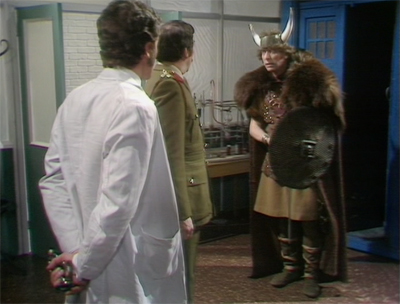
Okay, 90% of the pictures on this article are going to feature Tom Baker doing randomly surreal things…
That’s undoubtedly intentional, and the serial is constructed to evoke King Kong, another story about a gigantic monster with an obvious affection for a female human character. It would almost be sweet, except that the robot somehow manages to ham things up to an almost impossible degree. I have no problem with Doctor Who being camp, but there’s a tonal mismatch here. The robot is meant to be sympathetic, but it’s often too ridiculous to take half-way seriously. And that’s ignoring the dodgy CSO – another Pertwee staple.
The robot is probably meant to seem childlike to us, but it instead seems like a teenager having a tantrum. “I am confused!” it exposits. “I do not understand! I feel pain!” Later on, it laments, “Oh! I have killed the one who created me!” The lines are hardly Shakespeare, but the delivery is atrocious. It might be endearing if we weren’t supposed to feel sympathy for this poor misguided monster. Indeed, it’s the fact that we don’t care about the robot at all that really damages the serial.
It’s a shame, because the parts about the robot actually evoke far more sympathy than the robot itself. There’s something quite sad about the version of Kettlewell we meet in the first two episodes. “Yes, well, I gave him my own brain pattern,” he explains of the creature. “He has my principles, my ideals.” In a nice subtle touch, Kettlewell refers to the robot as “him.” Unfortunately, Kettlewell’s motivations and his character arc randomly change direction in the middle of the serial, and then he sort of fades to the background.
There also seems to be a conscious effort to separate Sarah Jane from the Doctor, and Elisabeth Sladen is left to do a lot of the show’s heavy lifting. I think this is a nice illustration of how Sladen made Sarah Jane so popular – it’s hard to imagine Katy Manning doing something similar. And Sladen also tries to convince us to care about the robot. After Hilda tests the mechanical monster’s programming, Sarah Jane admonishes the scientist, “That was a cruel thing to do.” Hilda retorts, “Cruel? It isn’t human, you know. It has no feelings.”
“Oh, it’s got a brain, hasn’t it?” Sarah Jane replies. “It walks and talks like us. How can you be sure it doesn’t have feelings too? Are you all right?” Now, Sarah Jane hasn’t really spent that much time with the robot, and the dialogue is corny as hell, but Sladen does a wonderful job selling it. It’s just a shame that the robot itself undermines all this compelling sympathy that the cast try to drum up for it. In a way, the robot is a massive weak link in Robot.
And, sadly, I’m not just talking emotionally and narratively. The design of the robot isn’t brilliant, but at least it gets the job done. Unfortunately, the set pieces featuring the creation are less than impressive. At one point, the Doctor manages to blind him by putting the hat over his eyes. It also leads to what might be described as “Pertwee action sequence fail”, as the lamest shots in UNIT fail to stop the SRS leaving their hall. Hilda half-heartedly shields herself behind the robot, but the other members of the SRS seem to walk out as casually as if they are picking up the morning paper.
There are some nice touches, just not enough. I like, for example, that the robot’s “prime directive” is a clear nod to Asimov’s First Rule. I also like that the principle used to override it (“you are an enemy of humanity – I must destroy you”) seems like a conscious homage to Asimov’s “zeroith rule” – the idea that saving humanity is more important than saving one human. It’s a shame that it is never really developed.
It is also nice to see the Brigadier before the show phased him out. Of course, the character could never go travelling the cosmos with the Doctor, but I do like the unique dynamic he brought to the show. While Ian and Barbara were not afraid to call the Doctor out, the Brigadier was the first time that power balance in the relationship between the Doctor and his companion seemed disturbed. The Brigadier was a decent man, but one with objectives distinct from those of the Doctor, and one with more practical concerns. Conflict is the essence of drama, and rooting it in a respectful relationship just makes it all the more effective.
However, there’s no way that the Fourth Doctor and the Brigadier could have a working relationship, and that much is clear even here. Baker plays the character as this gigantic overwhelming force. For all the Third Doctor made demeaning remarks about his human hosts, it was clear that he felt part of the family, and had a clear responsibility to them – even after it became possible to leave. He might have challenged the Brigadier on occasion, but the duo respected one another and could converse. The discussions between the Fourth Doctor and the Brigadier seem decidedly more awkward. Baker’s performance makes it clear that the Fourth Doctor feels he has better things to do.
So it’s nice to spend a final story with Nicholas Courtney. I love his somewhat understated reaction to the regeneration. “Oh, well, here we go again,” he seems to lament. It suggests that he has enough knowledge of the process that he isn’t worried, but not enough to know quite what he’s getting in for. He seems to consider it more of a minor inconvenience than a major dynamic shift. It’s quite clear that the Brigadier – a trained officer who likes his routine – is expecting business as usual, just with a new face. It’s a nice bit of characterisation, and Courtney plays it well.
Still, we get a hint that perhaps it is time to move on from the so-called UNIT family, that the Doctor’s departure might not just be in his best interest, but in the best interest of those around him. “You know, just once I’d like to meet an alien menace that wasn’t immune to bullets,” the Brigadier observes, suggesting he is tiring of all this excitement. Later on, he seems practically enthused as it looks like there’s a problem that UNIT might be able to handle on its own. “I think just for once, we’re not going to need the Doctor.” Of course, he’s wrong, but we get the sense that it’s time for UNIT to step out from the Doctor’s shadow, as much as it is time for the Doctor to move on.
And now we reach the crux of the episode. Because, let’s face it, nobody is watching this for the giant robot. Well, at least I hope nobody’s watching it for the giant robot, but who am I to judge? The real heart of Robot is the regeneration of the Doctor and the radical shift from the Third Doctor to the Fourth Doctor. This is certainly more interesting than the actual plot of the adventure, and Baker gets off to a wonderful start to what turns out to be a fantastic tenure.
As writer Terrance Dicks sums up:
The early years of Tom, he was riding the crest of a wave. It was flagging a little at the end, Tom inherited a prime-time successful show that everybody loved and for the first four or five years of Tom’s time, he did as well as we had done or better. Obviously like the Conservative government if you stay in too long, you run into problems. I think he changed in the later days. I think the ones I did, like State of Decay and Horror of Fang Rock, I think he maybe got more assured and he was slightly less scatty and slightly more authoritative, which was a good thing because you can overplay that. I always felt that there was a darker side to Tom’s Doctor and that he might go for it, that he might be tempted into evil. You really know that Peter Davison is never going to be tempted into evil because he’s too decent and he plays cricket, and you know he’s never going to be tempted over to the dark side.
While seven years in the role would see Baker transform the Fourth Doctor from booming bohemian to tired veteran, there’s a freshness and energy to his work here that’s hard to deny.
While the Third Doctor might have been staunchly anti-authoritarian, he was also still a part of the establishment. He worked for the United Nations, and dressed in a velvet suit with frills. Pertwee gave the character a wonderful gravity and heavy moral authority. Baker’s Doctor would also have those, but they were offset by a general instability and energy that made him a great deal more unpredictable than his direct predecessor. Indeed, the moment that Tom Baker springs to life, it’s quite clear that the status quo is over.
The Fourth Doctor is defined in contrast to the Third Doctor, and it’s really the major strength of putting the character inside a story that seems constructed for his predecessor. It allows us to imagine how the Third Doctor would have handled the situation, and immediately makes us aware of just how different this interpretation of the title character must be. Of course, it would be better if the story were a good story, but it serves its purpose as a vehicle for Baker.
For example, the Fourth Doctor seems immediately dismissive of UNIT. He tries to sneak off. When he talks with the Brigadier, he makes snide passive aggressive comments where the Third Doctor would at least directly challenge his colleague. When the Brigadier boasts about his defense cordon, the Fourth Doctor muses, “Never cared much for the word impregnable. Sounds a bit too much like unsinkable.” It’s not just a comment about the infrastructure, it’s clearly directed at the Brigadier himself.
Similarly, Sarah Jane has to needle him into sticking around. It’s clear that the Third Doctor’s loyalty to his colleagues hasn’t survived his regeneration. “And I mean, you are still UNIT’s scientific advisor,” she reminds him. “Remember? Well, you can’t go rushing off and leave them in the lurch.” The Doctor retorts, “Can’t I? Goodbye.” We immediately get the sense of this Doctor as more of a wanderer and a bohemian than his direct predecessor. He seems to positively dread the idea of putting down roots. “The Brigadier wants me to address the Cabinet, have lunch at Downing Street, dinner at the Palace, and write seventeen reports in triplicate. Well, I won’t do it. I won’t, I won’t, I won’t.”
As an aside, I think this aspect of the character pays off quite well in his final season. Like the Third Doctor, the Fourth Doctor has constructed his own family, except his is more clearly structured like a nuclear family. The Third Doctor had UNIT and Sarah Jane, but the Fourth Doctor ended up with Romana as an equal partner, the young Adric and their dog K-9. The only difference is that the Third Doctor put down roots on Earth, while the Fourth Doctor’s family lived inside the TARDIS, with no fixed abode. Interestingly, the regeneration of the Third Doctor ended his family unit, while the dissolution of the Fourth Doctor’s family (Romana in particular) seemed to push him closer to his regeneration.
There are other differences between the Fourth Doctor and the man he succeeded. He’s a lot more eccentric, and less of a man of action. Although he’s very smart, he seems to spend a lot less time planning, and a lot more improvising. I love the note he leaves Sarah Jane. “Sarah, Professor Kettlewell tells me that he has the robot hidden at his house. Gone to meet him. PS it is of course possible that this message is a trap. If it is I can deal with it. PPS I am leaving this note in case I can’t.”
Similarly, he subdues an SRS official without resorting to Venusian aikido, instead tripping the poor fellow up with his scarf. And then there’s his rather wonderful seat-of-his-pants attempt to stall for time at the SRS meeting. “Good evening, everyone. Now please, stay calm. Everyone keep your seat. Now then, what can I do to entertain you till my friend the Brigadier arrives? A little song? A little dance, perhaps? Not just a little dance? Anyone for cards?”
To be fair to Dicks, he makes an attempt for a nice and logical character arc, with Sarah Jane forced to accept the transformation of the Doctor. The technique of separating Sarah Jane from the Doctor for most of the story works, because it means that the final scene – where Sarah jane accepts a jelly baby from the Timelord – carries a bit of weight. She can accept this alien stranger in the role, so surely we can too? That said, it’s not the most logical or fluid of arcs.
For one thing, her difficulty with losing the Third Doctor and seeing a stranger in his place is only really hinted at, as she discovers that this new version of the character doesn’t work in the same way that his predecessor did. And her acceptance of him never seems in doubt. The decision to separate the pair feels more like plot contrivance than a clear attempt by Sarah Jane to get away from this new fellow in the Doctor’s place. Still, it has the faintest of echoes of Russell T. Davies’ later work in The Christmas Invasion, with the companion learning to embrace this new actor in the role. The classic series never really emphasised characterisation, so that’s a very good thing. It just doesn’t feel substantial enough, though.
Ah, well. I’ve always thought it a little funny that Tom Baker, that most iconic of Doctors, should have such middle-of-the-road regeneration stories. At least his swansong, Logopolis, was ambitious, but Robot really just feels like it’s treading water. Still, better things were coming, with Philip Hinchcliffe taking over as producer for the next serial, and the tone changing dramatically so that Baker didn’t feel as if he was a placeholder in another actor’s show.
There’s no point in being grown up if you can’t be childish sometimes.
– the Fourth Doctor, in a nutshell
Filed under: Movies | Tagged: arts, Baker, Barry Letts, bbc, Brigadier, doctor, doctor who, DoctorWho, Fourth Doctor, Harry Sullivan, Ian Marter, Jon Pertwee, literature, Online Writing, Pertwee, Peter Davison, robots, Sarah, science fiction, second doctor, State of Decay, tardis, terrance dicks, Tom, Tom Baker, UNIT, War Games |
















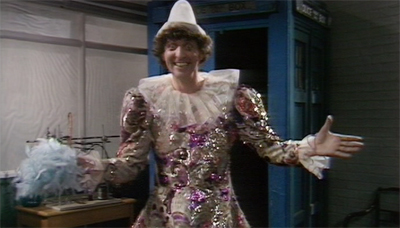
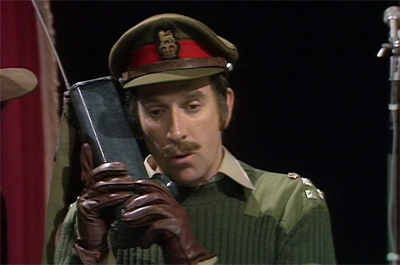

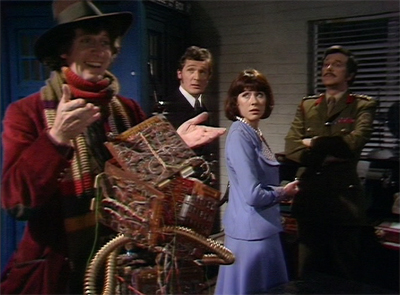
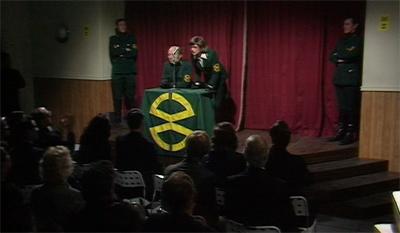


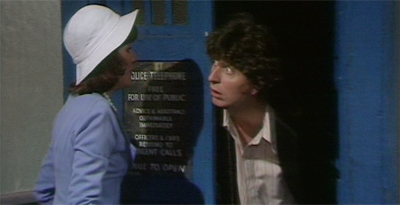



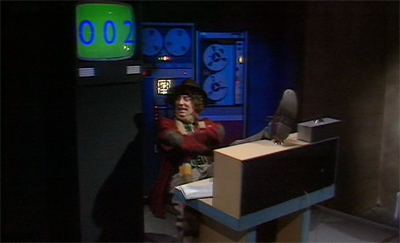










Leave a comment